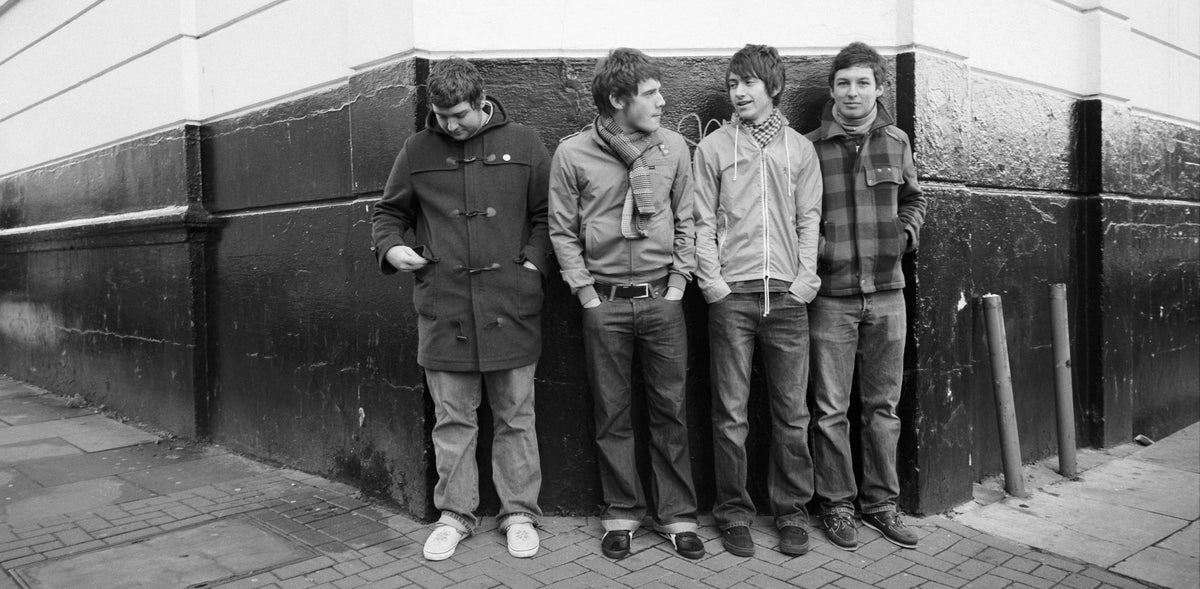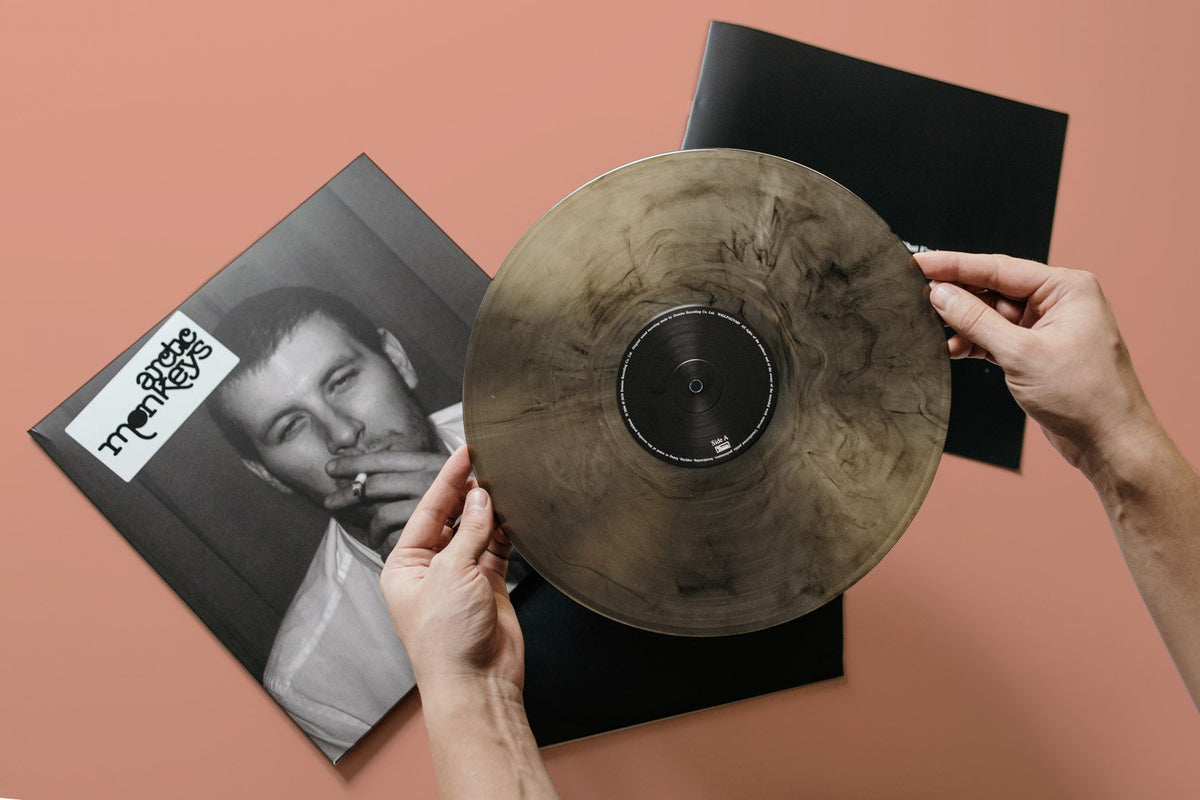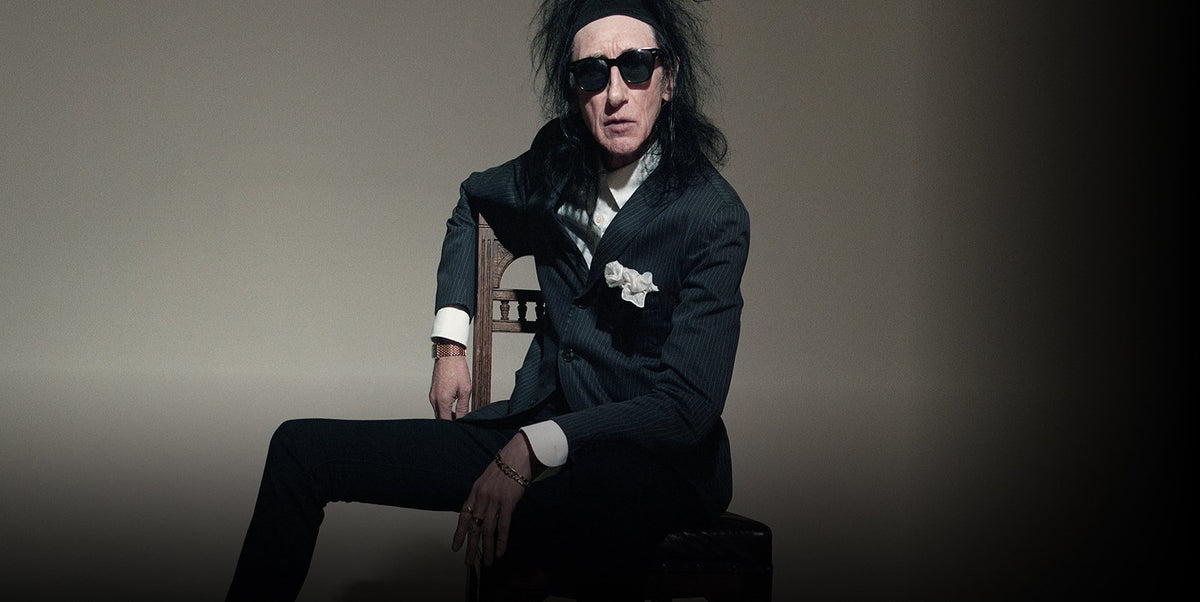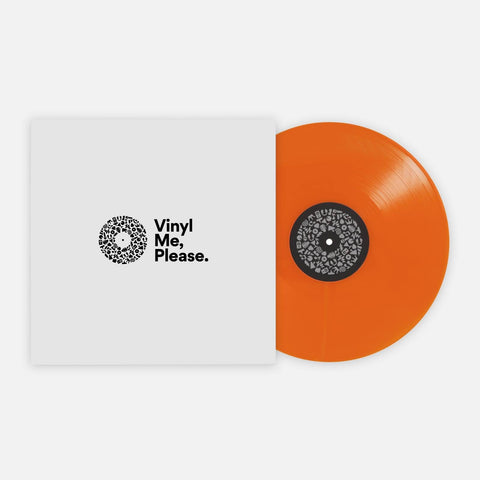Arctic Monkeys’ Timeless, Resonant ‘Whatever People Say I Am’
Read The Liner Notes To Our Deluxe Reissue Of The Band’s Debut
“Somebody call 999, Richard Hawley’s been robbed!”
As acceptance speeches go, Alex Turner’s request that someone telephone the British version of 911 upon learning he’d just won the 2006 Mercury Prize, will be hard to beat. Witty, clever, inspired, daring and acknowledging its influences – fellow Yorkshire musician Hawley whose record Coles Corner was also up for the same prestigious UK award – the Arctic Monkeys frontman’s off the cuff reaction to the band’s first major honor in many ways captured the spirit of the album they had triumphed with, their irrepressible, eccentric and energetic debut: Whatever People Say I Am, That’s What I’m Not.
Having concluded the speech warning against “too many tricks” in music, the band were ushered in front of the cameras of the British press pack for a fractious inquisition. “It’s like we won the Grand Prix or something,” observed Turner as he, guitarist Jamie Cook and drummer Matt Helders (Nick O’Malley attended the ceremony but did not take part, having replaced original bassist Andy Nicholson after the album’s release) began a short-lived, angry and bemused press conference that mainly involved guitarist ‘Cookie’ berating journalists for continuing to ask the same question (“How does it feel to win?”). Then moments later, Helders, Turner and myself were shunted together in an nondescript corridor on the way to the kitchen.
While the mainstream press had enjoyed only limited access to the group – the rapid deterioration of the winners’ press conference suggesting their management’s cautious approach was justified – the NME, for whom I was then News Editor, had fared better… but only just. I had five minutes.
The interview began with me effectively asking them how it felt to win--I know, but I hadn’t seen the press conference at that point-- but I got away with it by actually asking how the duo felt to be in the same company as M People who’d surprisingly beaten Blur to the same prize in 1995. By fluke, Helders was a fan of the soul-lite pop band. “Oh God, yeah! I love M People,” he enthused, before making me feel positively ancient by adding “They remind me of when I was a kid and my mum and dad used to listen to them!” Then I asked Alex if he’d had inkling that he was on to a good thing when they first started writing songs for their debut.
“No mate! And it’s been a right successful little fucker, that album! In every way,” he grinned. “It’s sold a lot of records, but whatever, it means a lot to a lot of people and I’m 100 percent about that! It’s not just about numbers, it’s done great things in terms of getting people excited, that’s what I think about it. I’ll remember it for that rather than numbers or awards or whatever, as fantastic as that is, it’s the experience that’s most important.”
And had its creation had been a great experience too? “It’s the best year of our lives, isn’t it? Not bad for a first job is it?” concluded the singer. “What do we do now, though? Probably go mental…”
Perceptively, Turner was spot on. His band’s debut album really did mean a lot. With their record released just seven months earlier by Domino Records, the Arctic Monkeys’ ascent was rapid, but it was one of substance. The first album was not just good, and worthy of the sales and accolades it received, it had rejuvenated and revolutionized the British music scene. And blimey, it had done it quickly.
It was a little over a year beforehand that a gaggle of sweaty fans and half the staff of NME and had squeezed around the 2005 Reading Festival’s New Band Stage. Hundreds more – fans and media alike – were stuck trying to sneak a glimpse while listening to the band from outside the circus tent, all because of a host of demos posted on a message-board by a friend of the group who styled himself as “Sheriff Of Sheffield”-- and one self-released EP--had made the group the hottest prospect in years.
What struck me, as someone who had been sent his seven-inch copy of Five Minutes with Arctic Monkeys (which featured early versions of “Fake Tales of San Francisco” and “From the Ritz to the Rubble”) by the PR, was not only were the band brilliant, but without a debut album, the fans’ passion for Arctic Monkeys was a kind of intense you only see for bands with multiple albums out. Thanks to those demos posted online – which were re-shared on MySpace initially linking the band’s rise to the social network despite them not actually having an account – everyone in that festival tent knew every word to every – still officially unreleased – song. Something special was clearly happening, so all Arctic Monkeys had to do was simply record those songs, capturing the essence of that August afternoon on record while creating a debut album that would still surprise and enthrall their audience.
In retrospect, it is amazing to consider how much expectation sat on those not-yet-20-year-old shoulders. Yet the band seemed so unfazed. This confidence even inspired some in the press to disbelieve it was that these 18 and 19 years-olds from Sheffield were writing their own songs and around the album’s release The Guardian highlighted music industry conspiracy theories claiming someone else was writing the band’s material, with lyrical references to the Police’s “Roxanne” in one song “proof” that someone else older was involved. However, the resulting debut album did not just answer those questions with its obvious authenticity, but it lived up to the considerable hype generated by those early shows, with “I Bet You Look Good On The Dancefloor” debuting at Number One in the UK charts (ironically Alex Turner even asks viewers “not to believe the hype” in the grainy live video that accompanied the single) and NME including their debut at Number Five in our Best British Albums Of All Time list the week before the record’s actual release.
Although the list wasn’t my idea, I was called out by a BBC Radio 6 Music reporter for “unfairly raising expectations on the band” because I’d written the review of the record, a piece the 28 year-old me concluded by stating: “Passion, belief and style are timeless, and so is this record.” But I wasn’t alone in my enthusiasm.
Whether it’s the constant rain, the word of mouth that comes from a large number of people living together on a island, or that we’re still trying to compensate for the fact the most influential rock star of all time, Elvis, only ever visited the UK on his way home from the Army, the explosive, era-defining British debut album is a practically a sub-genre in its own right (though it’s possibly not a phenomenon as keenly embraced on the opposite side of the Atlantic, which might explain the slower, more skeptical response some American audiences had to the Monkeys’ initial charms). From the Beatles to the Sex Pistols, Joy Division to Oasis, the Stone Roses and the Streets, these artists’ first records have all shaken our isles with youthful enthusiasm, energy and innovation.
Taking its name from a line in an Alan Sillitoe novel published nearly half a century beforehand, Whatever People Say I Am, That’s What I’m Not represents a decade-defining peak for British music in the 2000s. The product of listening to the Strokes’ debut LP and Roots Manuva albums after school--plus paying attention in English class while in it-- guitar lessons--everyone learns Roxanne here to practice barre chords--and plenty of youthful indiscretions and adolescent adventures (more to follow), Arctic Monkeys’ first collection of songs emerged from a set of influences and experiences not just common between the band and their contemporaries, but ones which most people with half an interest in writing songs all share. Yet from the urgent drum rolls and pulsing guitars of opening song “The View From The Afternoon,” it’s clear this ‘band DNA’ has meshed into something uniquely exciting. With its mechanical jerks, seedy storytelling and rhythmic breakdown, the first track is not only a fizzing intro in to the album, but it’s a gateway into a world full of sideway glances down Sheffield backstreets, life at the wrong time of the night and would be Romeos grappling with teenage frustration.
It’s a well of nocturnal naughtiness this album draws from repeatedly, yet the band emerges with something fresh, as the chart-topping “I Bet You Look Good On The Dancefloor” confirms. A clarion call for British guitar bands with its 100-mile-an-hour riffs and deep-in-the-disco witticisms, the single connected with the wider British public in a way no one back in that festival tent would have predicted a few months earlier. The album’s breakneck, three-song opening salvo is completed by the then old favorite “Fake Tales Of San Francisco,” which hosts a satirical recreation of the ambitious Yorkshire scene that spawned Arctic Monkeys themselves. It’s sharp, it’s cutting, it’s angry, but it’s not vicious. It’s observational and opinionated, but never judgemental, and it sums-up why Whatever People Say I Am, That’s What I’m Not resonated so strongly. The songwriting is of the world it charts – never above it. Its attitude and its energy come from genuine youthful enthusiasm. It’s the kind of record you can only write once in your life, right at the start, because it’s one you can’t fake. But it’s also the kind of album that requires something special to truly work. Teenage kicks, after all, are not a novel subject for the rookie songwriter, so you have to find new ways in. In a previous generation, fellow northern lyricist Morrissey had applied a novelist’s eye to his youthful observations, giving the Smiths’ wordplay and eloquence. Reflecting his era of cheap DVDs and satellite TV movie channels, Alex Turner’s similarly channeled the “literature” of his day, emerging as as the director of his scenes his lyrics create. In every song on this album there’s visual detail, point of view, internal monologue and conscious scene-framing. The songs may swirl around a world of after hours trouble but the Arctic Monkeys’ lyrical auteur carefully never repeats a shot.
Thus while “Dancing Shoes,” the record’s fourth track, kicks off a triptych of tracks that further expands Turner’s snapshot of nightclubs, sweaty bodies and adolescent butterflies, each song takes us somewhere fresh. “Dancing Shoes” rolls with its loquacious rhythms and gentle sarcasm, but the angle changes dramatically for the splurging dating disaster of “You Probably Couldn't See For The Lights But You Were Staring Straight At Me,” before “Still Take You Home” moves us on to chart end-of-the night desperation in all its woozy, guilt-filled glory. The almost folkish “Riot Van” then takes us outside the club, trying to make sense of the internal logic behind the thrill of baiting the police… then running away just in time, while “Red Light Indicate Doors Are Secured: details the near military planning required by all groups of lads trying to get a taxi in Britain while drunk – which might not sound like promising subject matter for a song, is much more universal than you’d possibly expect (until you’ve been there, staring at an empty road at 3 a.m.).
“Mardy Bum” with its “cuddles in the kitchen” is probably the closest thing Arctic Monkeys have done to a proper love song, so much so that despite its obvious popularity with live audiences, it was absence from sets for a while after a fit of teenage embarrassment kicked in. And it’s true it is a love song, a touching vignette of domestic diplomatic relations (mainly the boyfriend narrator trying to dig himself out of a hole) but it’s a charming, perfectly shot scene from the heart so it works.
The defiant, fuzz-filled voodoo maraca of “Perhaps Vampire Is A Bit Strong…” is a crack at hometown doubters. “When The Sun Goes Down” paints an equally less than flattering picture of the band’s neighbourhood, with its chunky guitars and bounding rhythms underscoring the unease of a wrong turn at the wrong time. This detailed account of an accidental encounter with the dark but not quite fearful world of a provincial red light district, brilliantly not only captures the “scummy man” whose “got a driving ban amongst some other offences…” who bosses the place, but also that ‘can’t stop looking’ shame and loss of innocence that comes from chancing upon a ‘safe’ area during in the day for the first time at night.
The relentless rhythms of “From The Ritz To The Rubble” shakes with the fuzzy anger and sore head of the morning after one of the epic, boozy night out on the dance floors detailed earlier, before “A Certain Romance” rolls the credits with its whimsically clipped guitar and a solecismic sadness of thinking no one else in the world shares your vision that there might just be something more going on with life.
The irony of course is that plenty of people did share Arctic Monkeys’ vision. They resonated with Whatever People Say I Am, That’s What I’m Not’s energy, they recognized the experiences Alex Turner’s snapshots captured and then they moved their “dancing feet” to the cavalcade of of riffs and rhythms. The album was the best selling British record of 2006, yet, the achievement of Arctic Monkeys is bigger than just articulating shared experience in a catchy manner – after all, they had already achieved that with their online demos as those early festival audiences showed.
Despite their tender years--or perhaps because of them-- with Whatever People Say I Am, That’s What I’m Not, Arctic Monkeys found a new and unique way to chronicle the rushes of youth, and in doing so created a classic take on a stage of life we all experience. This album could be a blueprint for an imagined future; a reminiscence of the past; or your existence now. No matter where you are in your life, this album will always make sense and resonate, and that is Arctic Monkeys’ true achievement. Passion, belief and style are timeless, and so is this record.
"Paul Stokes is a journalist and broadcaster who lives in London. He has contributed to MOJO, the BBC, The Guardian, Q and NME among others, and has interviewed Arctic Monkeys on many occasions. The band's Jamie Cooke even once slept through one of Paul's interviews, although he later told the writer it was one of his favourites.
Related Articles
Join the Club!
Join Now, Starting at $36Pages







